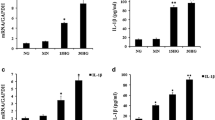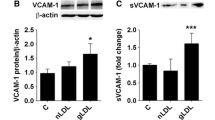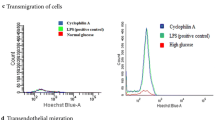Abstract
A non-resolving inflammation of the endothelium is recognised to be an important process leading to atherosclerosis. In diabetes, this process is thought to account for a significant number of cardiovascular disease-associated death and disability. However, the molecular mechanisms by which diabetes contributes to endothelial inflammation remain to be established. Whilst there is some evidence linking hyperglycaemia-induced reactive oxygen species (ROS) formation by the mitochondrial electron-transport chain to oxidative stress, cellular injury and apoptosis in the endothelium, a clear link to endothelium inflammation has not yet been established. The mitochondrial molecular stress protein Hsp60 is known to be secreted from mammalian cells and is capable of activating pro-inflammatory mediators on target cells expressing Toll-like receptors (TLRs). Hsp60 is also known to be elevated in serum of diabetes patients and has been shown to be upregulated by hyperglycaemic growth conditions in cultured human HeLa cells. This study shows that Hsp60 induced in human acute monocyte leukaemia cell line (THP-1) cells grown under hyperglycaemic conditions (25 mM glucose) was able to be secreted into growth media. Furthermore, the secretion of Hsp60 from THP-1 cells was able to be inhibited by 5,5-(N-N-dimethyl)-amiloride hydrochloride (DMA), an exosomal inhibitor. Interestingly, the conditioned media obtained from THP-1 cells grown in the presence of 25 mM glucose was able to induce the secretion of TNF-α in human vascular endothelium cell line (HUVEC). When conditioned media was immuno-depleted of Hsp60, there was a significant reduction in the release of TNF-α from the HUVEC cells. This suggests that a potential link may exist between hyperglycaemia-induced expression of Hsp60 in monocyte cells and vascular inflammation. Circulating levels of Hsp60 due to mitochondrial stress in diabetes patients could therefore be an important modulator of inflammation in endothelial cells and thus contribute to the increased incidences of atherosclerosis in diabetes mellitus.





Similar content being viewed by others

References
Almanzar G, Ollinger R, Leuenberger J, Onestingel E, Rantner B, Zehm S, Cardini B, van der Zee R, Grundtman C, Wick G (2012) Autoreactive HSP60 epitope-specific T-cells in early human atherosclerotic lesions. J Autoimmun 39:441–450
Asea AAA, De Maio A (2007) Heat shock proteins: potent mediators of inflammation and immunity: potent mediators of inflammation and immunity. Springer
Bassan M, Zamostiano R, Giladi E, Davidson A, Wollman Y, Pitman J, Hauser J, Brenneman DE, Gozes I (1998) The identification of secreted heat shock 60-like protein from rat glial cells and a human neuroblastoma cell line. Neurosci Lett 250:37–40
Cabiscol E, Bellı́ G, Tamarit J, Echave P, Herrero E, Ros J (2002) Mitochondrial Hsp60, resistance to oxidative stress, and the labile iron pool are closely connected in Saccharomyces cerevisiae. J Biol Chem 277:44531–44538
Campanella C, D'Anneo A, Gammazza AM, Bavisotto CC, Barone R, Emanuele S, Lo Cascio F, Mocciaro E, Fais S, De Macario EC et al (2015) The histone deacetylase inhibitor SAHA induces HSP60 nitration and its extracellular release by exosomal vesicles in human lung-derived carcinoma cells. Oncotarget 7:28849–28867
Chen W, Syldath U, Bellmann K, Burkart V, Kolb H (1999) Human 60-kDa heat-shock protein: a danger signal to the innate immune system. J Immunol 162:3212–3219
Daiber A, Steven S, Weber A, Shuvaev VV, Muzykantov VR, Laher I, Li H, Lamas S, Munzel T (2016) Targeting vascular (endothelial) dysfunction. Br J Pharmacol 174:1591–1619
D'Souza SM, Brown IR (1998) Constitutive expression of heat shock proteins Hsp90, Hsc70, Hsp70 and Hsp60 in neural and non-neural tissues of the rat during postnatal development. Cell Stress Chaperones 3:188–199
Fiorentino TV, Prioletta A, Zuo P, Folli F (2013) Hyperglycemia-induced oxidative stress and its role in diabetes mellitus related cardiovascular diseases. Curr Pharm Des 19:5695–5703
Frostegard J (2013) Immunity, atherosclerosis and cardiovascular disease. BMC Med 11:117
Giacco F, Brownlee M (2010) Oxidative stress and diabetic complications. Circ Res 107:1058–1070
Gonzalez Y, Herrera MT, Soldevila G, Garcia-Garcia L, Fabián G, Pérez-Armendariz EM, Bobadilla K, Guzmán-Beltrán S, Sada E, Torres M (2012) High glucose concentrations induce TNF-α production through the down-regulation of CD33 in primary human monocytes. BMC Immunol 13:1–14
Grenon SM, Aguado-Zuniga J, Hatton JP, Owens CD, Conte MS, Hughes-Fulford M (2012) Effects of fatty acids on endothelial cells: inflammation and monocyte adhesion. J Surg Res 177:e35–e43
Grundtman C, Kreutmayer SB, Almanzar G, Wick MC, Wick G (2011) Heat shock protein 60 and immune inflammatory responses in atherosclerosis. Arterioscler Thromb Vasc Biol 31:960–968
Gupta S, Knowlton AA (2007) HSP60 trafficking in adult cardiac myocytes: role of the exosomal pathway. Am J Physiol Heart Circ Physiol 292:H3052–H3056
Haak JL, Buettner GR, Spitz DR, Kregel KC (2009) Aging augments mitochondrial susceptibility to heat stress. Am J Physiol Regul Integr Comp Physiol 296:R812–R820
Hall L, Martinus RD (2013) Hyperglycaemia and oxidative stress upregulate HSP60 & HSP70 expression in HeLa cells. SpringerPlus 2:1–10
Jovaisaite V, Mouchiroud L, Auwerx J (2014) The mitochondrial unfolded protein response, a conserved stress response pathway with implications in health and disease. J Exp Biol 217:137–143
Juwono J, Martinus RD (2016) Does Hsp60 provide a link between mitochondrial stress and inflammation in diabetes mellitus? J Diab Res 2016:8017571
King RJ, Grant PJ (2016) Diabetes and cardiovascular disease: pathophysiology of a life-threatening epidemic. Herz 41:184–192
Lyu L, Wang H, Li B, Qin Q, Qi L, Nagarkatti M, Nagarkatti P, Janicki JS, Wang XL, Cui T (2015) A critical role of cardiac fibroblast-derived exosomes in activating renin angiotensin system in cardiomyocytes. J Mol Cell Cardiol 89:268–279
Malik ZA, Kott KS, Poe AJ, Kuo T, Chen L, Ferrara KW, Knowlton AA (2013) Cardiac myocyte exosomes: stability, HSP60, and proteomics. Am J Physiol Heart Circ Physiol 304:H954–H965
Mandal K, Foteinos G, Jahangiri M, Xu Q (2005) Role of antiheat shock protein 60 autoantibodies in atherosclerosis. Lupus 14:742–746
Martinus RD, Garth GP, Webster TL, Cartwright P, Naylor DJ, Hoj PB, Hoogenraad NJ (1996) Selective induction of mitochondrial chaperones in response to loss of the mitochondrial genome. Eur J Biochem/FEBS 240:98–103
Merendino AM, Bucchieri F, Campanella C, Marcianò V, Ribbene A, David S, Zummo G, Burgio G, Corona DFV, de Macario EC et al (2010) Hsp60 is actively secreted by human tumor cells. PLoS One 5:e9247
Pockley AG (2003) Heat shock proteins as regulators of the immune response. Lancet (London, England) 362:469–476
Rabczynski M, Fiodorenko-Dumas Z, Adamiec R, Paprocka-Borowicz M, Dumas I (2012) Role of anti-HSP 60/65 antibodies in atherogenesis in patients with type 2 diabetes and lower limb ischemia. J Physiol Pharmacol 63:691–696
Said FA, Werts C, Elalamy I, Couetil JP, Jacquemin C, Hatmi M (2002) TNF-alpha, inefficient by itself, potentiates IL-1beta-induced PGHS-2 expression in human pulmonary microvascular endothelial cells: requirement of NF-kappaB and p38 MAPK pathways. Br J Pharmacol 136:1005–1014
Shah MS, Brownlee M (2016) Molecular and cellular mechanisms of cardiovascular disorders in diabetes. Circ Res 118:1808–1829
Shanmugam N, Reddy MA, Guha M, Natarajan R (2003) High glucose-induced expression of proinflammatory cytokine and chemokine genes in monocytic cells. Diabetes 52:1256–1264
Swaroop S, Sengupta N, Suryawanshi AR, Adlakha YK, Basu A (2016) HSP60 plays a regulatory role in IL-1beta-induced microglial inflammation via TLR4-p38 MAPK axis. J Neuroinflammation 13:27
Tabas I, García-Cardeña G, Owens GK (2015) Recent insights into the cellular biology of atherosclerosis. J Cell Biol 209:13–22
Tian J, Guo X, Liu X-M, Liu L, Weng Q-F, Dong S-J, Knowlton AA, Yuan W-J, Lin L (2013) Extracellular HSP60 induces inflammation through activating and up-regulating TLRs in cardiomyocytes. Cardiovasc Res 98:391–401
Tsuei A-C, Martinus RD (2012) Metformin induced expression of Hsp60 in human THP-1 monocyte cells. Cell Stress Chaperones 17:23–28
Verrijn Stuart AA, de Jager W, Klein MR, Teklenburg G, Nuboer R, Hoorweg JJ, de Vroede MA, de Kruijff I, Fick M, Schroor EJ et al (2012) Recognition of heat shock protein 60 epitopes in children with type 1 diabetes. Diabetes Metab Res Rev 28:527–534
Wang AT, Prinsep MR, Martinus RD (2016) Pterocellin A isolated from marine bryozoan Pterocella vesiculosa is cytotoxic to human HeLa cells via mitochondrial apoptotic processes. Spring 5:742
Yuan J, Dunn P, Martinus RD (2011) Detection of Hsp60 in saliva and serum from type 2 diabetic and non-diabetic control subjects. Cell Stress Chaperones 16:689–693
Zhao Y, Zhang C, Wei X, Li P, Cui Y, Qin Y, Wei X, Jin M, Kohama K, Gao Y (2015a) Heat shock protein 60 stimulates the migration of vascular smooth muscle cells via Toll-like receptor 4 and ERK MAPK activation. Sci Rep 5:15352
Zhao Y, Zhang C, Wei X, Li P, Cui Y, Qin Y, Wei X, Jin M, Kohama K, Gao Y (2015b) Heat shock protein 60 stimulates the migration of vascular smooth muscle cells via Toll-like receptor 4 and ERK MAPK activation. Sci Rep 5:15352
Author information
Authors and Affiliations
Corresponding author
Rights and permissions
About this article
Cite this article
Martinus, R.D., Goldsbury, J. Endothelial TNF-α induction by Hsp60 secreted from THP-1 monocytes exposed to hyperglycaemic conditions. Cell Stress and Chaperones 23, 519–525 (2018). https://doi.org/10.1007/s12192-017-0858-x
Received:
Revised:
Accepted:
Published:
Issue Date:
DOI: https://doi.org/10.1007/s12192-017-0858-x



